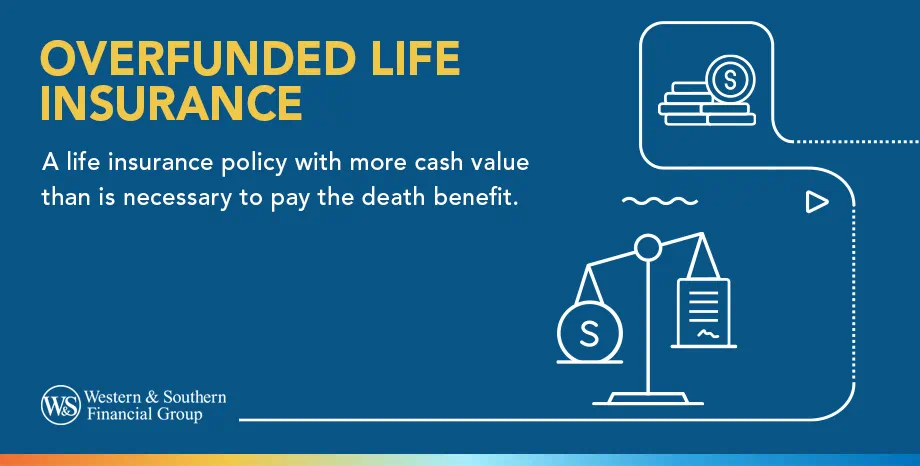Table of Contents
Table of Contents


Key Takeaways
- Overfunding life insurance involves paying extra into permanent policies, boosting their cash value.
- Potential benefits include increased cash value for later use.
- Overfunding can lead to adverse tax consequences if certain limits are exceeded, including turning the policy into a Modified Endowment Contract (MEC).
- It's crucial to consult a financial representative and tax professional to understand the implications and help decide if overfunding is the right strategy for your needs.
Whole life insurance and other permanent policies can help to provide a financial cushion for your loved ones after you've passed. While the primary benefit of any life insurance policy is the death benefit, there may be other ways that a policy can help you work toward your own financial goals. Here's some information on how overfunded life insurance works and who this strategy could be right for.
Overfunded Life Insurance Defined
You typically need to pay a certain premium each year or each month to ensure that the policy stays in force and that your beneficiary will receive the death benefit. Overfunded life insurance is when you pay more premiums into a policy than are required. Permanent life insurance policies, such as whole life insurance or universal life insurance, have a cash value component. So, by overfunding your policy, you contribute more to the cash value.
Overfunded life insurance is when you pay more premiums into a policy than are required. Keep in mind that different policies have different rules, and there are limits on the maximum amount that can be paid into a policy without incurring adverse consequences. You'll likely want to discuss overfunding your policy with a financial representative. A tax professional can also help you ensure that you won't owe additional taxes or encounter other tax-related problems.
When Might You Overfund a Life Insurance Policy?
Overfunding an insurance policy might make sense in some situations. Here are a few examples.
You Plan to Access Cash Value
Overfunding a life insurance policy might be beneficial if you plan to use the policy's cash value later in life. Since you can typically draw from your permanent policy's cash value in the form of loans or withdrawals, overfunding the policy could potentially increase the amount of money that's available to you later on. Assessing the cash value of a life insurance policy reduces its cash value and death benefit and increases the chance the policy will lapse. And if a policy lapses with an outstanding loan in excess of its cost basis, it's taxable.
You Want to Manage Taxes
As mentioned before, life insurance policies have certain tax features, such as a tax-free death benefit and tax deferred cash value growth. There are a couple ways that overfunding your life insurance policy could help to provide tax benefits, but there are also potential consequences to consider.
Potential for growth without tax liability: You typically do not pay income taxes on the interest you earn inside of a life insurance policy until you take a withdrawal or you fail to repay a loan and your policy lapses. That's different from interest you earn in taxable bank and brokerage accounts, which require you to report those earnings to the IRS each year.
Generally no annual IRS limits on additions: Unlike IRAs, the Internal Revenue Code does not set a yearly limit on how much you can contribute to a life insurance policy. That said, the Internal Revenue Code does limit how much you can pay into a life insurance policy before you incur adverse tax consequences.
Did You Know?
If you go over that maximum limit, one consequence you may face is having your policy treated as a Modified Endowment Contract (MEC), which could lead to losing the favorable tax treatment you otherwise receive with a cash value life insurance policy.
While life insurance policies that are designated as MECs still provide an income tax-free death benefit for beneficiaries and tax-deferred cash value accumulation, any distributions from the policy can be subject to taxation to the extent that money in the policy has grown. Also, any distributions are subject to an additional 10 percent penalty if the policyowner is younger than 59 ½ years old.
The tax features of a life insurance policy can be complicated, so it's important to review your strategy with a tax professional and your financial representative before making any decisions.
Discover how overfunding gives you more financial freedom. Get a Life Insurance Quote
How Much Can You Overfund a Whole Life Policy?
Overfunding a whole life insurance policy can make sense if you plan to access its cash value later in life or if you want to manage your taxes and take advantage of certain tax benefits. While the Internal Revenue Code does not set a yearly limit on how much you can contribute to a life insurance policy, the Internal Revenue Code does limit how much you can pay into a life insurance policy before you incur adverse tax consequences. If you exceed this maximum limit, one consequence you may face is having your policy treated as a Modified Endowment Contract (MEC), which can lead to losing your favorable tax treatment.
If the policy is a MEC and there is overfunding, any loans or withdrawals will be taxed to the extent that there is gain in the policy. In the event that the policyowner is under the age of 59 ½, any loans or withdrawals may be subject to an additional 10% tax.
Which Type of Policy Is Considered To Be Overfunded by the IRS?
A life insurance policy becomes a Modified Endowment Contract (MEC) and reclassified by the IRS when it exceeds specific payment limits. An MEC is a life insurance policy identified by the IRS to be overfunded, having exceeded federal tax law limits. MECs were created by the U.S. Congress in 1988 to prevent policyholders from using insurance policies as potentially high-growth, tax-sheltered funds.
The Tax Code uses the seven-pay test to help the IRS determine if your policy will be designated as a MEC. It compares the total premium you paid generally in the first seven years of the policy with the amount needed for the policy to be paid up after seven level annual premiums. If your policy exceeds this limit your policy will fail the seven-pay test and be designated as a MEC. Once a policy is designated as a MEC, it can’t be reversed. In addition, if a policy experiences a material change in later years (e.g., change in face amount or the addition of a rider), a new seven-pay period starts and the test is reapplied. While a policy that is designated as a MEC still provides an income tax-free death benefit for beneficiaries and tax-deferred cash value accumulation, any distributions from the policy can be subject to taxation to the extent that money in the policy has grown.
The Bottom Line
Overfunding a life insurance policy may be the right move for some people. However, this strategy isn't right for everyone, so consider speaking with your financial representative and a tax professional as you map out what's best for you.
Maximize the potential of your life insurance safely. Get a Life Insurance Quote































